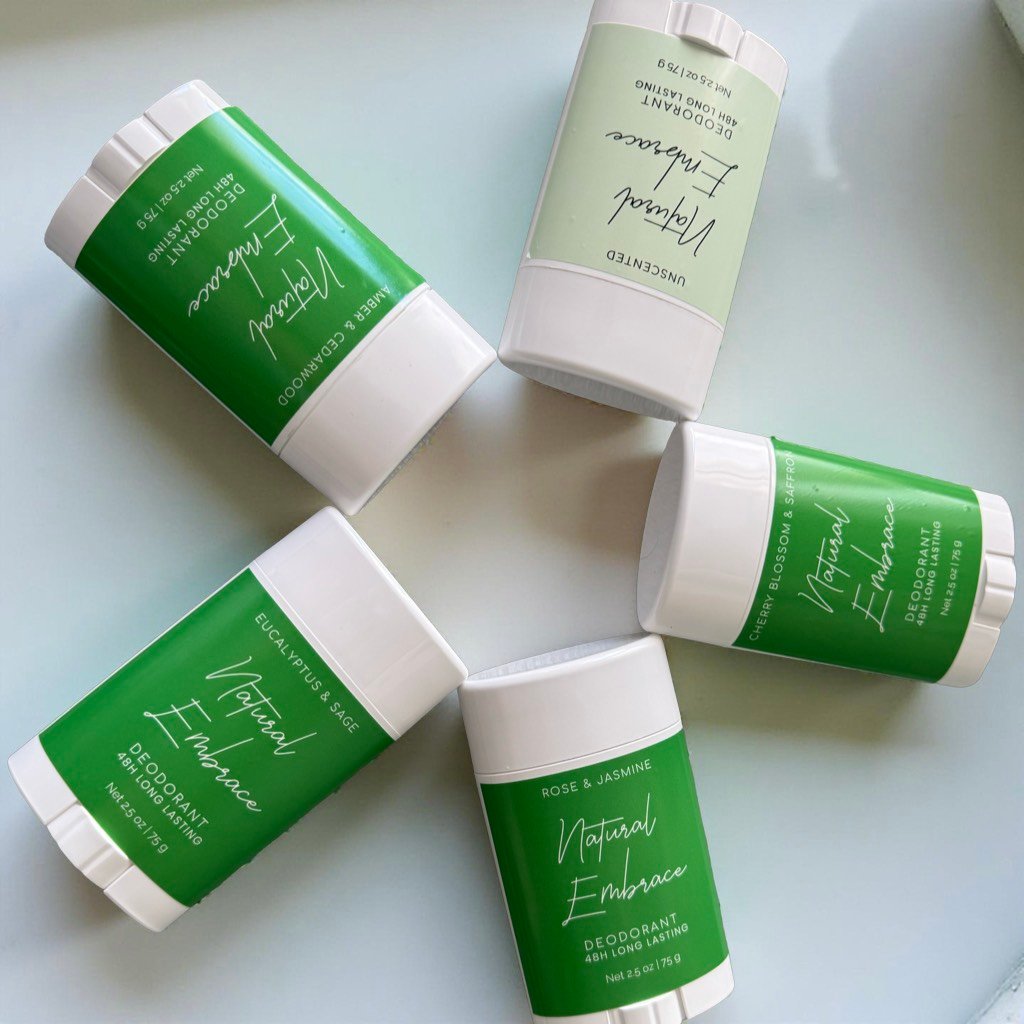Introduction: Are You Putting Harmful Chemicals on Your Skin?
Every morning, millions of people apply conventional deodorants and antiperspirants without questioning what’s inside them. But what if the product you’ve been using for years is doing more harm than good?
Most traditional deodorants contain a cocktail of chemicals—aluminum, parabens, synthetic fragrances, and alcohol—which can disrupt hormones, irritate the skin, interfere with the body’s natural detox processes, and expose you to unnecessary toxins.
In contrast, natural deodorants offer a safer, healthier way to stay fresh without the risks. But are they really effective? Can they truly replace conventional products?
This blog uncovers the dangers of traditional deodorants and explains seven scientifically-backed reasons why switching to a natural deodorant is one of the best things you can do for your body.
The Hidden Dangers of Conventional Deodorants
1. Aluminum-Based Antiperspirants: Blocking Sweat = Blocking Your Body’s Natural Functions
The biggest problem with traditional antiperspirants is aluminum-based compounds like aluminum chlorohydrate and aluminum zirconium. These ingredients work by blocking sweat glands, preventing perspiration.
But here’s the truth: Sweating is a natural and necessary bodily function.
Your body needs to sweat for:
- Temperature regulation (to prevent overheating)
- Detoxification (sweat helps eliminate heavy metals like lead and mercury)
- Balancing the skin’s microbiome (to prevent bacterial overgrowth)
By blocking sweat, antiperspirants interfere with the body’s natural detox process, trapping toxins inside your body instead of allowing them to be expelled (Journal of Environmental and Public Health).
The Link Between Aluminum and Breast Cancer
There is growing concern that aluminum-based deodorants may contribute to breast cancer. Aluminum has been found to mimic estrogen, a hormone that plays a role in breast cancer development.
A 2021 study in the International Journal of Molecular Sciences found that aluminum salts can disrupt endocrine function and that long-term exposure may increase the risk of breast tissue abnormalities (International Journal of Molecular Sciences).
Though more research is needed, many experts recommend avoiding aluminum in personal care products as a precautionary measure.
2. Parabens: Silent Hormone Disruptors
Parabens (such as methylparaben, ethylparaben, and propylparaben) are preservatives commonly found in conventional deodorants. They are added to extend shelf life but come with serious health concerns.
Parabens are endocrine disruptors, meaning they can mimic estrogen and interfere with hormonal balance. Studies have linked paraben exposure to:
- Increased breast cancer risk
- Lower sperm count and fertility issues in men
- Thyroid dysfunction
A study published in the Journal of Applied Toxicology detected parabens in 99% of breast cancer tissue samples tested, raising concerns about their bioaccumulative nature (Journal of Applied Toxicology).
Natural deodorants eliminate this risk by using safe, plant-based preservatives instead.
3. Synthetic Fragrances and Alcohol: Skin Irritation and Allergic Reactions
Many conventional deodorants contain synthetic fragrances—a broad term that can represent hundreds of undisclosed chemicals.
Why is this a problem?
- Many synthetic fragrances contain phthalates, which have been linked to hormonal imbalances and reproductive issues.
- They are also common allergens that cause itching, redness, and irritation (Journal of Clinical and Aesthetic Dermatology).
- Alcohol-based deodorants dry out the skin, making it more susceptible to irritation and sensitivity.
Switching to a natural deodorant means using pure essential oils and plant-based ingredients for fragrance—without the risks.
4. Conventional Deodorants Contribute to Environmental Pollution
Traditional deodorants are not just bad for your body—they’re also bad for the planet.
- Plastic waste: Most deodorant containers are non-recyclable, contributing to landfill buildup.
- Aerosols and pollution: Spray deodorants release volatile organic compounds (VOCs) that contribute to air pollution and harmful greenhouse gas emissions.
- Non-biodegradable ingredients: Many conventional formulas contain petroleum-derived chemicals, which don’t break down in the environment.
Natural deodorants are often eco-friendly, biodegradable, and packaged in recyclable or compostable materials—a win for both your health and the planet.
5. Supports a Healthy Skin Microbiome
Your underarms contain a delicate balance of bacteria, which plays a role in both odor production and skin health.
Research shows that using antiperspirants completely rearranges the microbial ecosystem of the armpit (Scientific Reports). Long-term antiperspirant users experience a drastic shift in underarm bacteria, which can weaken the skin’s defenses and potentially make odor worse when stopping use.
Switching to a natural deodorant helps your skin microbiome stay balanced, allowing beneficial bacteria to keep odor-causing microbes in check naturally.
6. Gentle on Skin with Fewer Irritants
Many conventional deodorants contain synthetic fragrances and propylene glycol—90% of deodorants contain fragrance allergens (Contact Dermatitis Journal).
These ingredients are known triggers for allergic reactions and skin rashes. By switching to natural deodorants, which use plant-based ingredients instead of harsh chemicals, you reduce the risk of skin irritation, redness, and discomfort.
7. Allows Natural Sweat & Detox for Better Health
Scientific studies confirm that perspiration helps expel toxins and heavy metals (Environmental Science and Pollution Research).
Sweat can carry significantly higher levels of certain toxins like lead and BPA, compared to blood or urine. This suggests that sweating plays an essential role in eliminating harmful substances from the body.
By allowing your body to sweat naturally while using a natural deodorant to neutralize odor, you support a cleaner, healthier system.
How to Transition to a Natural Deodorant
If you’re switching from an aluminum-based antiperspirant, your body may go through a 7-14 day detox phase. Here’s how to make the transition smooth and odor-free:
- Exfoliate your underarms before switching to remove chemical buildup.
- Stay hydrated—drinking more water helps flush out toxins.
- Use a detoxifying mask (like bentonite clay) to speed up the transition process.
- Apply a thin layer of natural deodorant—a little goes a long way!
- Reapply if needed, especially in hot weather or after workouts.
Upgrade Your Routine – Make the Switch Today!
Your body deserves better—ditch the toxic chemicals and embrace a healthier, fresher way to stay odor-free with our premium natural deodorants.
- Cherry Blossom & Saffron – For Women
- Eucalyptus & Sage – For Men
- Unscented – For Sensitive Skin
- Rose & Jasmine – Elegant & Eco-Friendly Freshness
- Amber & Cedarwood – Sophisticated Scent, All-Day Freshness
Join the natural deodorant revolution today and experience a safer, cleaner, and more effective way to stay fresh—without compromise!
References:
- Journal of Environmental and Public Health
- International Journal of Molecular Sciences
- Journal of Applied Toxicology
- Journal of Clinical and Aesthetic Dermatology
- Scientific Reports
- Contact Dermatitis Journal
- Environmental Science and Pollution Research


